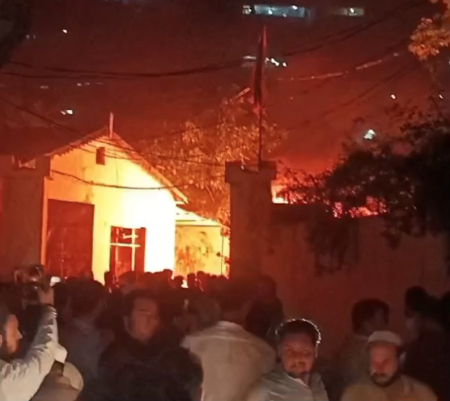Man accused of desecrating Quran set on fire by lynch mob in Pakistan

A man was violently lynched by a mob in Pakistan’s Khyber Pakhtunkhwa Province after accusations of desecrating a copy of the Quran were made against him. The victim, identified only as a tourist from Punjab Province, was initially taken into police custody before being forcefully taken by the mob and killed.
The incident in Swat Valley on Thursday night local time began when the accused was handed over to the police in the Madyan area, the U.K.-based group Christian Solidarity Worldwide said in a statement to The Christian Post.
According to Pakistan’s Dawn newspaper, announcements made over mosque loudspeakers incited a mob to gather and storm the police station. They seized the man, set fire to the station and a police vehicle, and murdered the man by shooting him and setting his body on fire.
Zahidullah Khan, a Swat District Police Officer, was quoted as saying that the mob’s violent actions resulted in injuries to eight other people and claimed that a heavy police presence was deployed to manage the unrest.
The Pakistani authorities have started an investigation to identify and apprehend those involved in the lynching, Reuters reported.
Graphic social media videos verified by police showed the horrific scenes of the lynching, sparking outrage among Pakistani social media users and reflecting the brutal reality of mob justice in the country.
Pakistan’s Planning Minister, Ahsan Iqbal, condemned the act during a National Assembly session on Saturday, criticizing the use of religion to justify vigilante and mob justice, according to the newswire.
Iqbal said mob justice was bringing the nation to a critical brink, stressing the importance of respecting all bodies, as mandated by Islam, and criticizing the act of burning bodies as part of mob killings.
Pakistan’s blasphemy laws are often misused for settling personal scores or targeting minorities and result in mob violence, CSW said.
“Pakistan must do far more to prevent such horrific acts of violence, including by ending any and all impunity that surrounds those who take the law into their own hands, and repealing the blasphemy laws which are incompatible with the country’s commitments to freedom of religion or belief,” said CSW’s founder and President Mervyn Thomas.
In his remarks, Minister Iqbal also reflected on his own survival from an assassination attempt and lamented the weaponization of religion in Pakistan, calling for serious governmental reflection and action to address these recurring violent incidents. He proposed the formation of a committee to tackle these issues and ensure Pakistan does not succumb to anarchy.
The lynching is not an isolated event in Pakistan. Similar incidents in Jaranwala and Sargodha areas in Pakistan’s eastern Punjab province have occurred where mobs have lynched individuals accused of blasphemy.
This pattern has brought international scrutiny to Pakistan’s handling of blasphemy accusations and mob justice.
Legal processes in Pakistan often precede mob actions based on rumors or complaints, with many of these cases resulting in no serious consequences for the perpetrators. This has been noted in reports by the U.S. Commission on International Religious Freedom, criticizing the frequent impunity in such cases.
Under the blasphemy laws in Pakistan, the death penalty can be given for insulting Islam. It carries no provision to punish a false accuser or a false witness.
In 2011, the governor of Pakistan’s Punjab province, Salman Taseer, was assassinated by his bodyguard for speaking out against the blasphemy laws.
That same year, Asia Bibi, a Christian mother of five, was sentenced to death for alleged blasphemy, sparking international outrage, leading to her acquittal in 2018 after spending eight years on death row.





















